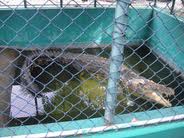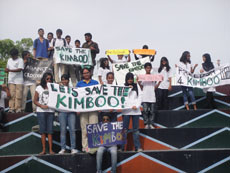Additional reporting by Ahmed Nazeer
A police team have been searching for black magic practitioners on Thakandhoo Island in Haa Alif Atoll after some islanders “purposefully” contacted the Maldives Police Service (MPS) and claimed Maldivian Democratic Party (MDP) supporters were responsible for the possession of four local children by evil spirits, according to an island council source.
The police arrived on the island around 10:00am yesterday morning and started inspecting houses. Their search is based on information police intelligence received, Thakandhoo Island Council Vice President Ibrahim Shaheed told local media.
The police team is inspecting individual houses under a court warrant, a police media official told Sun Online.
Four children from the same family began behaving strangely earlier this week, prompting islanders to call in ‘fanditha’ (magic) men who practice ‘ruqyah’ (Islamic exorcism) from the nearby island of Ihavandhoo, a Thakandhoo island council source told Minivan News today (September 12).
The MPS was called to investigate the black magic case after some of the islanders perceived the incident to be politically motivated, the island council source explained.
“Some of the islanders purposefully sent police officers to homes of MDP supporters on the island,” said the island council source. “The police came and gave them each documents that said their houses had to be searched regarding reports police intelligence received.”
“The documents also noted that police officers were unable to find anything related to the matter after searching their houses,’’ he added.
The Thakandhoo Island Council “wishes to get rid of this black magic issue forever and has asked the fanditha men to determine exactly who is responsible [for contacting the police],” the source noted.
Because the four children living in the same house on the island were believed to be possessed by evil spirits the islanders brought fanditha men to the island on Tuesday (September 10), and they immediately started reciting ‘maithiri’ (Quranic verses recited to end spiritual possession).
“When the recitation of maithiri started three days ago the kids situation got worse,’’ the island council source said. “But we were told by the fanditha men that it will be like that until the seventh day.”
The fanditha men also determined the general location of the buried black magic items and asked people to dig in the area.
They discovered the black magic objects buried in front of a gate located inside the Thakandhoo Island School, which leads to the playground outside school grounds.
‘’When we dug up the area we found these objects and now we have thrown them away,’’ said the island council source.
The black magic objects were reported to be clay tablets by local media.
Last night the island council met with the community to talk about this issue as people were feeling “scared and uncomfortable”, he added.
Police Spokesperson Chief Inspector Hassan Haneef was not responding to calls at time of press, however a police media official told Minivan News that the MPS was not revealing any information about the case as the investigation was ongoing.
Possessed children
“The police arrived yesterday and have been checking houses for black magic books, writing, or a witch – anything suspicious,” a Thakandhoo island resident told Minivan News.
“They checked three or four homes and are still here today, but are supposed to be leaving in the evening,” she added. “So far no one has been arrested, but they have taken some books into their possession.”
A 14 year-old girl, and boys aged 12,10, and nine – none of whom have had any previous behavioral problems – have been behaving very erratically and are difficult to control, the source explained.
“I’m not a believer [in black magic], I never have been, but it’s happening. And it’s so weird to see happening,” she said.
“It just started suddenly. The children began speaking and behaving in a very strange way. Their outbursts happen randomly – any time of day for the girl, but with the boys it happens mostly in the evenings,” she continued.
“The girl has been seeing black shadows, acting weird, complaining of ‘frozen’ hands and teeth, and saying strange things, ‘I’m going to kill you and somebody’s coming,’ and has fainted,” she explained. “She was admitted to the island’s health centre screaming uncontrollably not to remove the [clay] stones because it would kill her, and not to kill her.”
“[Additionally,] the 10 year-old boy has been continuously running super fast all over the island trying to get into the school and he also fainted,” she continued.
During the community meeting last night islanders had an opportunity to voice their concerns and were also instructed about how to be safe and what precautions to take against black magic, the island source noted.
“Everybody’s worried about the children and they’re concerned because there hasn’t been a black magic incident here for a long time, not since my grandmother was a child,” she said.
“We were advised to recite the Quran and for children not to go out after 6:00pm or go to isolated places unsupervised,” she added.
According to the source the island school has remained open, but some parents have not been sending their children to class for the past two days.
This prompted the school principal to tell parents attending the community meeting that “they should be sending their children to school because if we [islanders] don’t go out [of our homes] it will be more of a risk,” said the island source.
“People are not openly saying much about it because that will put them in danger as well,” she added.
In addition to reciting verses from the Quran, blessed water can also be used to conduct an exorcism, Spiritual Healers of the Maldives President and Exorcist, Ajnaadh Ali, explained Minivan News today.
He noted that the minimum period of treatment for those afflicted by black magic is seven days, but it can take up to one or two months depending on the case.
Thakandhoo islanders contacted the Spiritual Healers of the Maldives to assist with healing the possessed children, however because they are currently “taking treatment themselves”, the organisation has decided to conduct workshops on the island at a later date, added Ali.
Politics and black magic
This is the third island in two weeks to have reported black magic incidents related to political party rivalries.
Police were summoned to investigate an alleged black magic doll after it was discovered at the Shaviyani Atoll School polling station on Kanditheemu Island during the presidential election vote counting.
Coconuts with black magic spells were allegedly being used to sway voters’ political party allegiance and incite confrontations between MDP supporters and police on Fuvahmulah, ahead of the Presidential Election’s first round held September 7.
Additionally, police summoned a white magic practitioner to evaluate a young coconut believed to have been cursed by a black magic spell, after it was found near the Guraidhoo Island presidential election polling station.
Likes (0)Dislikes
(0)Dislikes (0)
(0)
 (0)Dislikes
(0)Dislikes (0)
(0)
